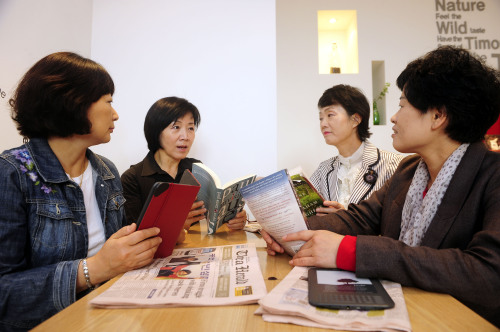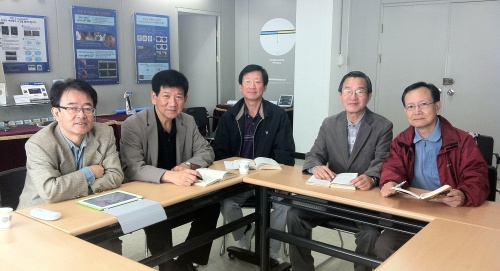Members of English-language book clubs enjoy foreign culture, friendship, while honing the languageIt’s a Tuesday morning in southern Seoul, and four middle-aged women are sitting in a cafe over their morning coffee.
Filling the space with chats and giggles, the gathering seems nothing more than a simple get-together of close friends. But their table, which is covered with English books and newspapers, hints something more is happening.
“We’ve been doing this for two years now,” says Lee Cheon-sook, a member of English-language book club named “FERG,” which stands for “Fiction in English Reading Group.”
“We’ve been friends for a long time. We see each other very often anyways, but this is a great way of spending time together while doing something that’s very meaningful.”
For the last two years, the women, who met each other for the first time while attending Kyunggi Girls’ High School in Seoul, have been meeting every Tuesday morning to discuss their weekly English-language readings.
It was Song Sun-hae, one of its members, who drew her long-time friends into the world of English-language fiction. Song, who has been an “avid reader” since her teenage years, had been involved with another English book club for about eight years before founding FERG with Lee Cheon-sook, Lee Kyoung-hee, Kim Yeo-mi, and Lee Hae-won.
“Most of the books we’ve read so far were chosen by Song,” another member, Lee Hae-won, says.
For Lee Cheon-sook, who studied English literature while attending university, the weekly book meetings have been an eye-opening experience.
“One of the greatest things about reading English-language fiction is that so many of its authors have different cultural and ethnic backgrounds from one another,” Lee says. “So I’ve come to understand about what’s going on around the world, and the history behind it.”
Meanwhile, Lee Kyoung-hee, another member, has a different story to tell. She had always preferred non-fiction over fiction before founding the club.
“Participating in this club has been a new experience for me in many ways,” Lee says. “I majored in biology in college and liked reading essays that are written in Korean. But here, I’d have to read materials that I wouldn’t normally choose to read, and on top of that, these materials will be in English. Of course it’s been a challenge, but it has also brought new perspectives to my life.”
By reading works of a wide range of authors, including F. Scott Fitzgerald, Jhumpa Lahiri, Toni Morrison, Orhan Pamuk, and Geraldine Brooks, the members have familiarized themselves with new subjects and ideas. Such topics include the lives of present-day Muslim women, gypsy customs and origins, and even the history of Judaism.
“It’s very exciting,” says Lee Hae-won. “A lot of ordinary moments of my life have changed because of the reading experience. It’s easier for me to imagine about foreign cities whenever I see their names on the world map; I understand the embedded historical context when I see gypsies in movies.”
Watching film adaptations of the books has been another joy.
“Films offer different interpretations of the original text,” Lee Hae-won says. “I actually watched the movie of ‘The Great Gatsby’ long time ago. And reading the book in its original English text was a refreshing experience.”
The club’s list of the books that have been made into films include: “The Reader” by Bernhard Schlink; “Revolutionary Road” by Richard Yates; “Beloved” by Toni Morrison; and “The Hours” by Michael Cunningham.
The women have so much to say about literature they don’t even realize their drinks are getting cold. Their friendship is apparent when they ask The Korea Herald to include Kim Yeo-mi in the story, one of the five members who couldn’t show up to the meeting on Tuesday. And reading was something they couldn’t do “together” back in the good old high school days, they say.
“When I was in high school, studying was my first priority,” says Lee Cheon-sook. “I regret not reading as many books as possible at the time. So I really appreciate what I can do with my friends now. In the end, I think, novels are about human beings. Reading books expands my knowledge and understanding of the universal human experience, and it is often comforting to know that people feel the similar things that I do even from the other side of the world.”

Members of FERG, an English book club which stands for “Fiction in English Reading Group,” chat during their weekly meeting in southern Seoul, Oct. 4. (Park Hae-mook/The Korea Herald)
In southern Seoul, there is another English-language book club, though very different from FERG. Started by professor Koo Bon-hyuk of University of Ulsan with his long-time high school friends back in 2006, the group solely focuses on non-fiction. They read about 15 pages a week, and thoroughly analyze the assigned text every Saturday morning.
Currently reading “Justice: What’s the Right Thing to Do” by Michael J. Sandel, the members are more than passionate about their weekly meeting. And there is a reason behind such enthusiasm. All of the books they’ve read so far, though written in English, have dealt with their shared interest.
“We read books such as ‘The Intelligent Investor’ by Benjamin Graham, and ‘The Essays of Warren Buffett,’” Koo says.
“I think we weren’t as affected by the 2008 financial crisis because of it,” he joked.

Members of FERG, an English book club which stands for “Fiction in English Reading Group,” chat during their weekly meeting in southern Seoul, Oct. 4. (Park Hae-mook/The Korea Herald)
The members bring different perspectives and opinions, as they all come from different professional backgrounds.
“I am an engineer and most of the English texts that I read while studying it were written in a very clear, simple way,” says Han Kyu-yong, one of the club members.
“But academic texts that deal with humanities or economics, which I have been reading at this club, are much more complex and require critical thinking. But I’ve been enjoying the challenge, and most of the things I learned from the books on finance and investing have been very helpful and practical.”
Won Yoo-hwang, who sometimes stays up till one in the morning to finish his required reading and write his own interpretation of the text, says he appreciates the expressions used by scholars who write in English.
“They are very different from everyday English,” he says. “And it’s very helpful to know how such academic issues are presented in a scholarly, professional way. And there is a pure joy in on-going learning. We are almost 60, and people say this is the era where many will live till they are 100. I think this also helps us staying young.”
Aside from reading English-language books, the five men also run together.
“We are long-time friends, so it’s always good to see each other even without the books,” says Sohn Woong-yul, another member of the group.
“I’ve been out of school for a long time, and this is like being in a school again. I have my books, I have my friends. And we do activities outdoor. This is great.”
Though very different in nature, members of the two groups offer very similar tips for those who’d like to start their own: Set realistic goals, do it with a small circle of close friends and choose the books that really interest you.
“But most of all, just start,” says Song Sun-hae of FERG. “Don’t think too much. Don’t think it’s going to be too hard. Just get a book and start reading. And you’ll realize it’s not something so difficult to accomplish at all.”
By Claire Lee (
dyc@heraldcorp.com)







![[Graphic News] More Koreans say they plan long-distance trips this year](http://res.heraldm.com/phpwas/restmb_idxmake.php?idx=645&simg=/content/image/2024/04/17/20240417050828_0.gif&u=)